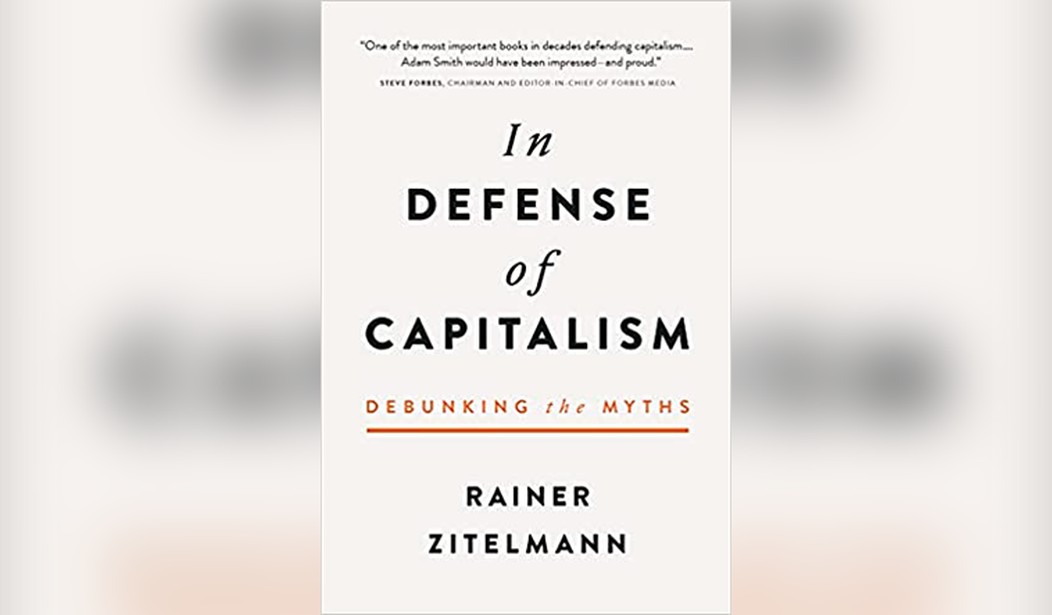In the United States and beyond, a battle of ideas between socialism and capitalism is taking place that threatens the freedoms so many around the world enjoy. So how does the pro-capitalist defend their position in a world increasingly shifting toward an embrace of socialism? Marxist-turned-capitalist historian Rainer Zitelmann has the answer.
In his newly released book, “In Defense of Capitalism,” the German sociologist takes on the biggest myths about capitalism that indisputably proves it has lifted more people out of poverty and improved their general lot in life than any other system.
“Before capitalism emerged, most people in the world were living in extreme poverty,” the bestselling author told Townhall. “In 1820, around 90 percent of the global population was living in absolute poverty. Today, the figure is less than 10 percent.”
But beyond debunking this notion—that capitalism is the cause of hunger and poverty—Zitelmann also takes on the fallacies that capitalism leads to growing inequality, is responsible for environmental degradation and climate change, leads to financial crises, wars, and monopolies, is dominated by the rich, promotes selfishness and greed, and more.
And while capitalists have the facts on their side, these realities have been successfully obscured by the intellectual elite, left-wing politicians, and other anti-capitalists to the point that most have bought their myths hook, line, and sinker. According to a survey Zitelmann conducted with the Allensbach Institute and Ipsos MORI, some of the most positive beliefs about capitalism came from countries one would least expect.
Recommended
“We presented our survey’s respondents with 18 different statements on capitalism – positive and negative,” Zitelmann explained in an email. “It should give pause for thought that the indisputable statement that ‘Capitalism has improved the situation of ordinary people in many countries’ made it into the Top Five in just two out of 34 countries: in Vietnam, where the statement received the second-highest approval rating of 73.7 percent and in Nigeria, where people associate capitalism with the hope of eradicating poverty and living a better life, this statement elicited the fifth most support.”
So, people in socialist Vietnam and African countries like Nigeria and Uganda are in fact “much smarter than my compatriots in my home country of Germany,” Zitelmann pointed out.
“In Germany, the statement ‘Capitalism has improved the situation of ordinary people in many countries’ elicited agreement from fewer respondents than any other statement on capitalism (15%), while the statement ‘Capitalism is responsible for hunger and poverty’ received three times more support (45%),” Zitelmann added. “An interesting contrast: in Uganda, the statement ‘Capitalism is responsible for hunger and poverty’ received the least support of all 18 statements.”
Indeed, one of the greatest challenges for capitalists is changing the global mindset about the economic system. This is because Zitelmann considers anti-capitalism a political religion whose adherents will not necessarily be convinced by facts since it is faith that guides their emotions.
But Zitelmann didn't write this book to convince the anti-capitalist. Instead, "In Defense of Capitalism" is meant to arm proponents with the history and facts so they can push back on the most prolific myths about the economic system wherever and whenever they encounter them. Because one thing capitalists could learn from their ideological competitors is how to successfully promote their ideas.
“From the balcony of my hotel, I watched thousands of anti-capitalist demonstrators in front of the Greek parliament building,” Zitelmann said of a recent trip to Athens promoting his book. “Half the time they were chanting and singing. I didn’t understand what they were singing, but you could see they were emotional, moving songs. That’s when I told my friend: ‘look, we only have facts, but they have songs.’ We should learn a lot from the anti-capitalists – not in terms of content, but in terms of marketing and PR.”
More information about "In Defense of Capitalism" can be found here.
























